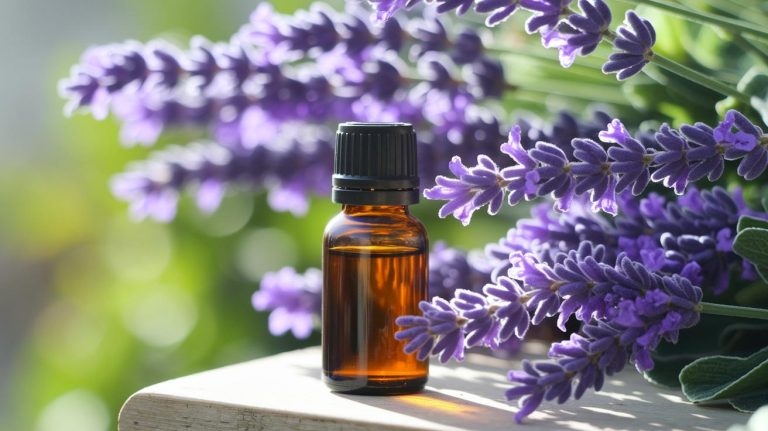Discover the Best Essential Oils for Sensitive Skin: Gentle Choices for Soothing Care
Sensitive skin requires careful selection when it comes to essential oils. Discover the best essential oils for sensitive skin, handpicked for their mild yet effective properties, and learn how to incorporate them into your skin care without causing discomfort.
Essential Insights: Nurturing Sensitive Skin with Gentle Essential Oils
Understanding Sensitive Skin
If redness, itchiness, or a burning sensation are common occurrences on your irritated skin, it’s probable that you’re part of the sensitive skin group. This reactive skin type can be triggered by various factors, from harsh weather to underlying skin conditions like eczema and rosacea.
However, don’t be disheartened. Sensitive skin management is possible by:
- Avoiding irritants
- Switching to gentle, fragrance-free products
- Using products enriched with antimicrobial and calming properties to enhance skin health.

Top Essential Oils for Sensitive Skin
Starting your journey to find the best essential oils for sensitive skin doesn’t have to be intimidating. Certain natural extracts stand out for their ability to calm without causing flare-ups. Among them, the best allies for delicate skin types are sensitive skin essential oils such as:
- Lavender oil
- Chamomile oil
- Frankincense oil
- Patchouli oil
- Neroli oil
- Helichrysum oil
- Rose oil
These plant-based extracts provide a range of soothing, anti-inflammatory, and moisturizing benefits, working together to safeguard and renew your most sensitive skin.
Lavender Oil
Lavender essential oil, known for its unique floral aroma, offers more than just a calming fragrance. It’s a panacea for inflamed skin, boasting the ability to quell irritation and combat pesky bacteria. Its antioxidant prowess further shields your skin cells from the onslaught of environmental stressors, making lavender oil a go-to oil for those seeking a tranquil refuge for their sensitive skin.
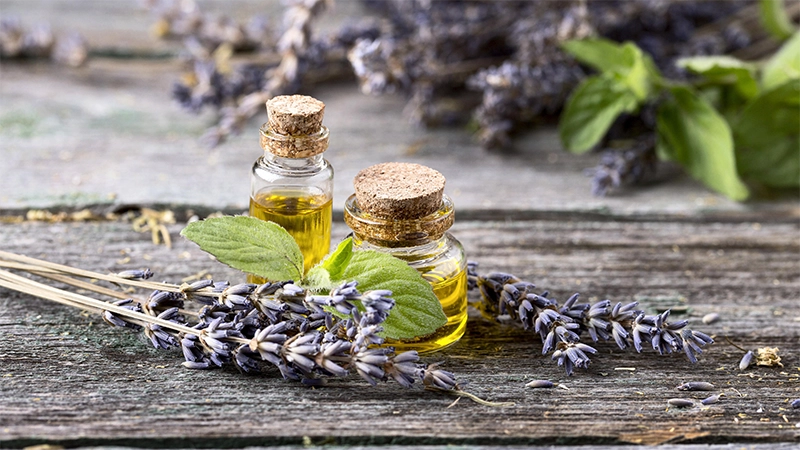
Chamomile Oil
Chamomile oil, with its calming nature, serves as a soothing agent for both the soul and skin. Its potent anti-inflammatory properties, courtesy of azulene and bisabolol, make it an exceptional choice for reducing redness and soothing inflamed skin.
For those whose complexions mirror their emotions, chamomile oil offers a gentle touch, easing away the day’s irritations and wrapping your skin in a veil of comfort, while coconut oil provides additional nourishment. Tea tree oil can also be considered for its soothing properties.
Frankincense Oil
Frankincense essential oil is a highly valued gem in the world of essential oils, adored especially by those with oily and mature skin. Its ability to provide essential lipids means it supports aging skin with grace, while its astringent properties help keep acne at bay.
This ancient resin invites your skin to partake in its regal benefits, ensuring your complexion remains balanced and serene.
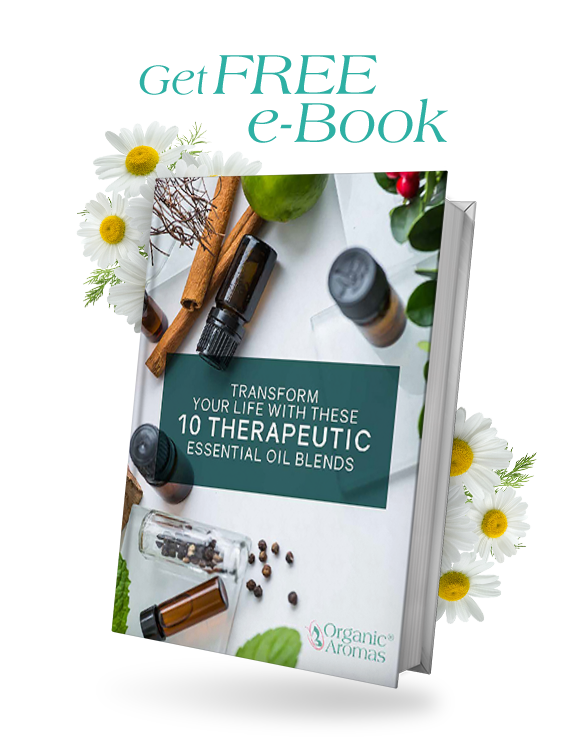
Sign Up to Get Your FREE Essential Oils e-Book Here
Patchouli Oil
Patchouli oil, known for its earthy and mysterious nature, provides relief for skin struggling with eczema and other irritations. Its proficiency in reducing pain and inflammation is a boon for those troubled by persistent rashes, allowing patchouli to emerge as a guardian for skin in distress. Embrace its grounding essence as it works to restore calm to your sensitive skin’s landscape.
Neroli Oil
Neroli oil, a luxurious elixir derived from the delicate blossom of the bitter orange tree, balances sebum production without dehydrating the skin. For sensitive skin that walks the line between dryness and oiliness, neroli offers balance, ensuring your complexion retains its soft, supple nature under its watchful care.

Helichrysum Oil
Helichrysum oil, a rarity with regal bearing, is adorned with anti-inflammatory and regenerative properties that cater to the unique needs of sensitive skin. This floral gem encourages your skin to heal and renew itself, granting you the gift of a complexion that glows with vitality and resilience.
Rose Oil
Rose oil, the essence of romance, extends its beauty beyond bouquets to bestow moisturizing and rejuvenating effects on sensitive skin. Its gentle touch softens and nurtures, while its capability to promote skin cell turnover whispers promises of youth and radiance. Entrust your delicate oily skin to the tender care of rose oil and carrot seed oil, and watch as it flourishes with newfound vitality.
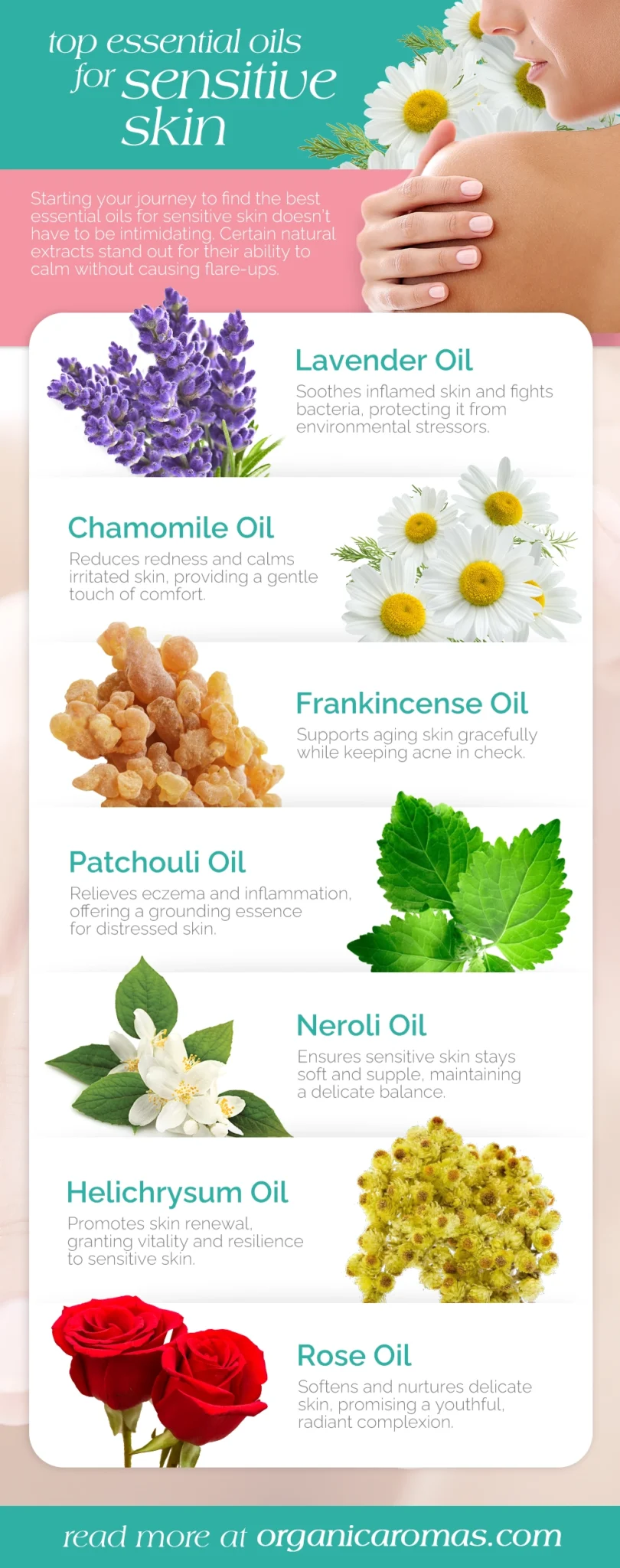
What’s in Essential Oils That Can Cause Irritation?
Hydrolats/Hydrosols
Hydrolats, also known as hydrosols, are essentially the softer sisters of potent essential oils, offering a more gentle yet equally beneficial option for those with sensitive skin. These captivatingly fragrant waters, generated through the meticulous distillation of various plant materials, can serve as an invigorating, yet super gentle, enhancement to your regular skincare regimen.

Hydrolats are revered for their remarkable ability to gently cleanse, pacify, and deeply hydrate the skin without introducing any risk of irritation. As such, they’ve earned a reputation as a sanctuary for the most tender and delicate skin types, such as those of the elderly, children or pregnant women.
Their gentle, non-aggressive nature, coupled with their aromatic and therapeutic benefits, make hydrolats a must-have addition to an all-inclusive skincare routine. Whether you’re seeking revitalization, hydration, or simply a skin-soothing experience, hydrolats stand as a safe and effective solution.
How to Choose the Right Carrier Oil
For sensitive skin, choosing the right carrier oil is as vital as selecting appropriate essential oils. Here are some oils that are celebrated for their affinity with sensitive skin:
- Jojoba oil
- Sweet almond oil
- Grapeseed oil
- Rosehip oil
These oils offer a nurturing base that enhances the therapeutic effects of essential oils. Opt for cold-pressed and organic varieties to ensure you’re providing your skin with the purest form of natural oils care.
Make Sure You Do A Skin Patch Test First!
Step 1: Dilute the Essential Oil
Mix 1-2 drops of essential oil with a carrier oil (such as coconut, jojoba, or almond oil) to dilute it. A good ratio is 1 drop of essential oil to 1 teaspoon of carrier oil for a safe concentration.
Step 2: Choose a Test Spot
Select a small, discreet area of skin for the test, such as the inside of your wrist or elbow.
Step 3: Apply the Mixture
Apply a small amount of the diluted essential oil to the chosen area. Cover the patch test area with a bandage or cloth, if desired, to protect it.
Step 4: Wait and Evaluate Results
Wait for 24-48 hours without washing the area. Monitor the spot for any signs of reaction, such as redness, itching, burning, or swelling. If there’s no reaction after 48 hours, the essential oil is likely safe for you to use. If you experience any discomfort or signs of an allergic reaction, wash the area immediately with soap and water, and discontinue use of the oil.
Essential Oil Blends for Sensitive Skin
Crafting custom blends for sensitive skin requires a delicate balance of scientific understanding and instinct. Start with a base of carrier oil and delicately weave in drops of:
- lavender
- chamomile
- geranium (must patch test first)
- helichrysum
These concoctions are more than mere mixtures; they are potions tailored to soothe, heal, and protect your sensitive skin, infusing your routine with the essence of natural beauty.

Tips for Using Essential Oils Safely on Sensitive Skin
Practicing mindfulness is the key to harnessing the benefits of the best essential oils for sensitive skin safely. Here are some steps to follow:
- Begin with a patch test to ensure compatibility.
- Dilute your oils to a gentle 1% concentration.
- If the symphony of scents causes any dissonance on your skin, listen to your body’s cues and adjust accordingly.
- Always prioritize the comfort and health of your delicate dermis.
Addressing Specific Sensitive Skin Concerns
Sensitive skin varies from person to person, necessitating customized solutions for each individual’s concerns. For those navigating the tempestuous tides of eczema, oils like rose, calendula, and cranberry seed offer a soothing lighthouse. Meanwhile, acne-prone individuals may find solace in the purifying embrace of tea tree, lavender, and cinnamon oils.
And for acne prone skin or skin prone to redness, a dab of lemon or eucalyptus oil can provide a calming balm, reducing the appearance of inflammation and restoring tranquility.
Natural Skincare Routine Incorporating Essential Oils
Incorporating essential oils into your skincare routine can elevate it to a self-care act that nourishes both skin and spirit. Whether you’re blending them into serums, toners, or moisturizers, these potent essences infuse each step of your routine with the power of nature.
Delight in the alchemy of creating your own sensitive skin potions, and revel in the radiant results.
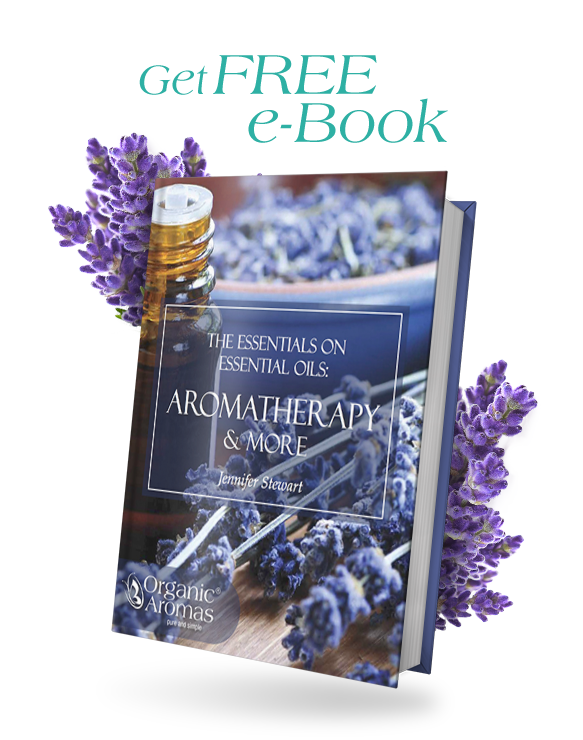
Sign Up to Get Your FREE
e-Book Here…
Precautions and Potential Side Effects
Despite the numerous benefits of essential oils, not all essential oils are suitable for everyone, as they are potent substances needing careful handling, particularly for sensitive skin. Be vigilant for signs of allergic reactions, and heed the warnings of photosensitivity. Above all, consult a healthcare professional before embarking on your essential oil journey if you’re pregnant, nursing, or managing health conditions, ensuring a path of wellness that safeguards your delicate skin.
Best Essential Oils for Sensitive Skin: Tailored Solutions for You!
As we conclude our journey through the aromatic world of essential oils for sensitive skin, we’re reminded of nature’s capacity to heal and enhance our well-being. These botanical treasures, when chosen and used with care, can offer gentle, effective solutions to the unique challenges sensitive skin presents. Embrace their power, and let the natural harmony they bring guide you to a future of balanced, radiant skin.
Frequently Asked Questions
Which carrier oil is best for sensitive skin?
For sensitive skin, consider using natural oils like avocado oil, coconut oil, and sweet almond oil, which are rich in antioxidants and essential fatty acids that nourish and hydrate the skin. Avoid oils that may cause irritation.
What essential oils are good for skin irritation?
Lavender, tea tree, chamomile, peppermint, and eucalyptus essential oils have anti-inflammatory and antiseptic properties that can help reduce redness, itching, and inflammation in skin irritation.
Can essential oils cause allergic reactions on sensitive skin?
Yes, essential oils can cause allergic reactions on sensitive skin. It’s important to perform a patch test and dilute the oils properly before use. If an allergic reaction occurs, discontinue use immediately and consult a healthcare provider.
How do I perform a patch test with essential oils?
To perform a patch test with essential oils, apply a small amount of diluted oil to a discreet area of skin, such as the inside of your wrist, and wait 24 hours to check for any irritation or redness.





